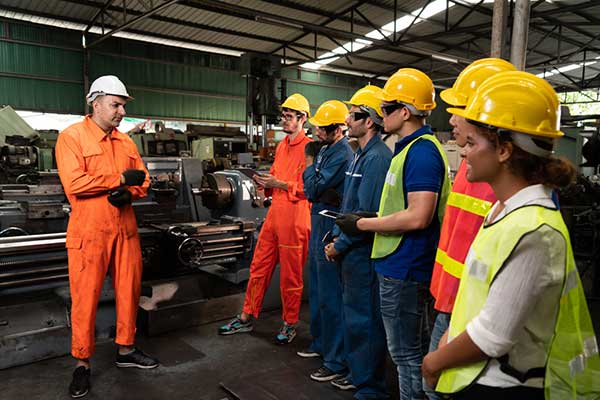In the engineering sector and in many others, continuous training is of the utmost importance.

As tools, technologies, and processes improve at a rapid pace, you should always be ready to polish and enhance your skills.
Therefore, it is fundamental to keep up to speed with new innovations and certain required skillsets. How does this modern, specific piece of machinery work? How to go about repairing it and keeping it functioning properly? These are questions that, as a maintenance engineer, you should always be able to answer with confidence.
With this in mind, we will discuss the reasons for which ongoing training and education is paramount in the world of engineering.
First of all, it is worth clarifying why Continuing Professional Development (CPD) is so important to engineers. The Engineering Council expects all its members to persist in continued training and development to both keep pace with the newest updates in the field and to solidify their competence in the role.
In fact, CPD can help improve credibility and confidence in your abilities, facilitating career progression in the long term. From achieving formal qualifications to on-the-job machinery training and external volunteering, there are many ways in which you can benefit from continued development.
What is more, members of the Engineering Council who do not adhere to CPD standards can be stripped of their professional titles. Therefore, it goes without saying that continued training is fundamental.
But in which ways does it help?
Let’s not beat around the bush: safety should be your number one priority. If you do not receive adequate on-the-job training, you may end up running into injuries when either operating or fixing machinery. Not only will you be placing yourself at risk, but you may also be putting your colleagues and the public in danger. This is particularly true when talking about industrial machinery.
In this respect, it is important to be able to spot potential faults, including missing safeguards, blockages, or malfunctioning parts, in a swift and straightforward manner. However, without up-to-date training, there is a possibility that you will struggle to identify a malfunctioning machine – including what is actually causing the problem. Alongside the risk of people getting hurt, failing to prevent an issue from getting worse can have a truly negative impact on the finances of a business.
Hence, it is fair to say that checking machinery and equipment on a regular basis is crucial. With ongoing training and teaching, you will be able to learn how to operate different brands’ tools and how to repair new models. By understanding the various procedures, including skilful tasks such as fitting new hydraulic cylinder parts, you will always have the chance to handle machinery safely and effectively. That said, however, if you do not feel confident doing this yourself, do not be afraid to outsource specific technical tasks to other employees.
Is there anything more rewarding than climbing the work ladder? Ongoing training and education can massively support your career progression. In fact, constantly upskilling your qualities and knowledge can lead to promotions and other enticing job opportunities.
Continued training, in fact, can help you develop your knowledge while giving you the skillsets to gradually operate at a more senior level. Indeed, it is no surprise that repairers and maintenance engineers who can navigate a wide variety of machinery are more likely to work on bigger, more stimulating projects. Not only will your newly acquired knowledge make your job more exciting, but it will also become a huge asset to your business on the whole.
As machinery continues to evolve hand-in-hand with the advancement of technology, reliance on the sole use of slide rules and hand-drawings is becoming more uncommon. Nowadays, technology can take over these laborious tasks, carrying them out with the utmost accuracy. As well as performing more tedious jobs, technology has also empowered human engineers to reach their full potential.
With the introduction of machine learning (ML), automation, and artificial intelligence (AI), digital solutions have rapidly become embedded in the engineering industry. New, avant-garde equipment may not scare emerging engineers, who have grown up around tech devices. However, ongoing training and education can provide ‘mature’ professionals, who are not as tech-savvy as their younger counterparts, with precious guidance on these innovations.
Making the most of technology is vital in the engineering sector. If you or your business are not trained effectively on its features, you’ll end up being left behind.
To conclude, on-the-job training ensures that the performance and progression of engineers is always on point. From preventing the risk of injuries to keeping pace with the swift, technological changes in the sector, continuing professional development and training is vitally important. Ultimately, it is the best way to ensure that you are performing your job to the best of your ability.
A warm welcome to our guest Didi Caldwell, CEO of Global Location Strategies (GLS) and one of the world’s top site selection experts. With over $44 billion in projects across 30+countries, Didi is reshaping how companies choose where to grow. Here she shares insights on reshoring, data-driven strategy, and navigating global industry shifts.